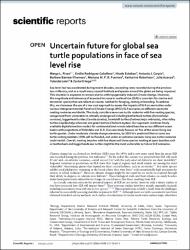Mostrar el registro sencillo del ítem
Uncertain future for global sea turtle populations in face of sea level rise
| Licencia | This article is licensed under a Creative Commons Attribution 4.0 International License, which permits use, sharing, adaptation, distribution and reproduction in any medium or format, as long as you give appropriate credit to the original author(s) and the source, provide a link to the Creative Commons licence, and indicate if changes were made. | es |
| Autor | Rivas, Marga L. | |
| Autor | Rodríguez-Caballero, Emilio | |
| Autor | Esteban, Nicole | |
| Autor | Carpio, Antonio J. | |
| Autor | Barrera-Vilarmau, Barbara | |
| Autor | Fuentes, Mariana M. P. B. | |
| Autor | Robertson, Katharine | |
| Autor | Azanza, Julia | |
| Autor | León, Yolanda M. | |
| Autor | Ortega, Zaida | |
| Fecha de admisión | 2023-05-04T00:02:29Z | |
| Fecha disponible | 2023-05-04T00:02:29Z | |
| Año | 2023 | |
| Citación | Rivas, M. L., Rodríguez-Caballero, E., Esteban, N., Carpio, A. J., Barrera-Vilarmau, B., Fuentes, M. M., ... & Ortega, Z. (2023). Uncertain future for global sea turtle populations in face of sea level rise. Nature Scientific Reports, 13(1), 5277. Recuperado de: | es |
| URI | https://bvearmb.do/handle/123456789/2732 | |
| Sinopsis | Sea level rise has accelerated during recent decades, exceeding rates recorded during the previous two millennia, and as a result many coastal habitats and species around the globe are being impacted. This situation is expected to worsen due to anthropogenically induced climate change. However, the magnitude and relevance of expected increase in sea level rise (SLR) is uncertain for marine and terrestrial species that are reliant on coastal habitat for foraging, resting or breeding. To address this, we showcase the use of a low-cost approach to assess the impacts of SLR on sea turtles under various Intergovernmental Panel on Climate Change (IPCC) SLR scenarios on different sea turtle nesting rookeries worldwide. The study considers seven sea turtle rookeries with five nesting species, categorized from vulnerable to critically endangered including leatherback turtles (Dermochelys coriacea), loggerhead turtles (Caretta caretta), hawksbill turtles (Eretmochelys imbricata), olive ridley turtles (Lepidochelys olivacea) and green turtles (Chelonia mydas). Our approach combines freely available digital elevation models for continental and remote island beaches across different ocean basins with projections of field data and SLR. Our case study focuses on five of the seven living sea turtle species. Under moderate climate change scenarios, by 2050 it is predicted that at some sea turtle nesting habitats 100% will be flooded, and under an extreme scenario many sea turtle rookeries could vanish. Overall, nesting beaches with low slope and those species nesting at open beaches such as leatherback and loggerheads sea turtles might be the most vulnerable by future SLR scenarios. | es |
| Idioma | English | es |
| Publicado | Nature Scientific Reports, 13(1), 5277 | es |
| Derechos | © The Author(s) 2023. | es |
| URI de derechos | http://creativecommons.org/licenses/by/4.0/ | es |
| Materia | Biodiversidad - República Dominicana | es |
| Materia | Fauna ─ República Dominicana | es |
| Materia | Hábitats y especies | es |
| Materia | Especies amenazadas | es |
| Materia | Cambio climático | es |
| Materia | Impacto ambiental | es |
| Título | Uncertain future for global sea turtle populations in face of sea level rise | es |
| dc.identifier.doi | https://doi.org/10.1038/s41598-023-31467-1 | |
| Tipo de material | Article | es |
| Tipo de contenido | Scientific research | es |
| Acceso | Open | es |
| Audiencia | Technicians, professionals and scientists | es |
Ficheros en el ítem
Este ítem aparece en la(s) siguiente(s) colección(es)
-
Investigación ambiental [1698]
La consulta y descarga de este documento están sujetas a esta licencia: This article is licensed under a Creative Commons Attribution 4.0 International License, which permits use, sharing, adaptation, distribution and reproduction in any medium or format, as long as you give appropriate credit to the original author(s) and the source, provide a link to the Creative Commons licence, and indicate if changes were made.
© The Author(s) 2023.
© The Author(s) 2023.


